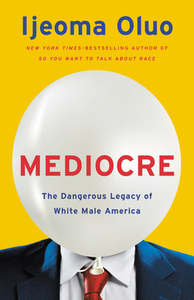You need to sign in or sign up before continuing.
Take a photo of a barcode or cover
As always, an insightful and timely book by Oluo that digs into history and juxtaposes it with what's happening in society now to present a compelling portrait of one of our biggest problems: the white male patriarchy. They overwhelmingly control our politics, our economy, our workplaces, and our society, to the expense of women and people of color on every level. Oluo asks us to imagine the possibilities of a world that didn't skew so heavily in the favor of the people who made it that way by holding down women and people of color to maintain that status quo.
I think the premise of mediocrity got muddled at the end. Also I listened to it, which may have been a disservice to me and the book. Despite all that, I highly recommend it and look forward to reading more of Oluo's work.
Dieses Buch ist ein absolutes Must-Read, wenn man sich für Politik und Geschichte der USA interessiert.
Ijeoma Oluo beleuchtet blinde Flecken und legt den Finger in die tiefe Wunde, auf die viele weiße Menschen lieber ein winziges Pflaster kleben würden, um dann nicht mehr darüber nachdenken zu müssen.
So werden die klassischen Cowboys entheroisiert, das Leid der amerikanischen Ureinwohner aufgezeigt, Sklavenhandel, Rassismus und Misogynie thematisiert und am Ende einfach sämtliches Unrecht schonungslos offengelegt.
Dabei tut das Lesen oft ziemlich weh, vor allem, weil so viele Fälle von Gewalt geschildert und misogyne Rassisten ungefiltert zitiert werden, aber auch, weil man immer einen Bogen zu unserer heutigen Gesellschaft schlagen kann und muss.
Die Autorin verbindet geschichtliche Fakten, die aktuelle Situation und eigene Anekdoten über ihre Erfahrung als Schwarze Frau sehr geschickt.
Außerdem zieht sie keine Grenzen und kritisiert nicht nur Trump (eh klar), sondern zum Beispiel auch Biden und Sanders - und in einem sehr überraschenden Kapitel (von dem ich nicht wusste, dass ich es brauchte, aber es tat SO gut) männliche Feministen. Alles natürlich gut begründet, mit Hand und Fuß.
Ich kann das Buch wirklich nur empfehlen, man lernt einfach unfassbar viel.
Ijeoma Oluo beleuchtet blinde Flecken und legt den Finger in die tiefe Wunde, auf die viele weiße Menschen lieber ein winziges Pflaster kleben würden, um dann nicht mehr darüber nachdenken zu müssen.
So werden die klassischen Cowboys entheroisiert, das Leid der amerikanischen Ureinwohner aufgezeigt, Sklavenhandel, Rassismus und Misogynie thematisiert und am Ende einfach sämtliches Unrecht schonungslos offengelegt.
Dabei tut das Lesen oft ziemlich weh, vor allem, weil so viele Fälle von Gewalt geschildert und misogyne Rassisten ungefiltert zitiert werden, aber auch, weil man immer einen Bogen zu unserer heutigen Gesellschaft schlagen kann und muss.
Die Autorin verbindet geschichtliche Fakten, die aktuelle Situation und eigene Anekdoten über ihre Erfahrung als Schwarze Frau sehr geschickt.
Außerdem zieht sie keine Grenzen und kritisiert nicht nur Trump (eh klar), sondern zum Beispiel auch Biden und Sanders - und in einem sehr überraschenden Kapitel (von dem ich nicht wusste, dass ich es brauchte, aber es tat SO gut) männliche Feministen. Alles natürlich gut begründet, mit Hand und Fuß.
Ich kann das Buch wirklich nur empfehlen, man lernt einfach unfassbar viel.
Ijeoma Oluo tackles such a huge and loaded topic in such a deft way that this is an incredibly readable book - despite being actually quite terrifying in it's scope and consequences. This is very focused on white american male power in particular, tracing the construction and deployment of white masculinity from the wild west to the NFL - but I think there is a lot of cross-over with other white patriarchal western societies. Oluo's final call to action in particular, to tackle white supremacist patriarchy wherever we see it, both in ourselves and in others, resonates strongly. A must read - actually probably more so for men than women.
I listened to this book on audio and really liked it as a way of experiencing this work. Having enjoyed Oluo's earlier book, 'So You Want to Talk About Race', I was interested in reading her perspective on white male privilege in America. Increasingly, the term white privilege has become part of the social justice lexicon but what gets lost in that I think is how strongly this privilege skews male. White men, in America certainly but not just there by any means, are able to fail upwards in a way that black people and even white women are simply not able to.
The only reason I didn't give this book 5 stars, is that there were sections I just couldn't relate to as a Brit. For example, there was a section on the treatment of black men in American college campus football teams and I just couldn't relate and found myself losing interest. Nevertheless, I completely agree with Oluo's larger point on the danger of rewarding white male mediocrity at the expense of marginalised groups.
White mediocrity sends a dangerous message - that if you are not white and male it doesn't matter how hard you work, you will rarely (if ever) be given access to the opportunities that will enable upward social mobility. It also states that all you need to lay claim to all your heart desires is to be white and male. Neither viewpoint is healthy, more importantly it limits us as a society and stunts our growth.
The only reason I didn't give this book 5 stars, is that there were sections I just couldn't relate to as a Brit. For example, there was a section on the treatment of black men in American college campus football teams and I just couldn't relate and found myself losing interest. Nevertheless, I completely agree with Oluo's larger point on the danger of rewarding white male mediocrity at the expense of marginalised groups.
White mediocrity sends a dangerous message - that if you are not white and male it doesn't matter how hard you work, you will rarely (if ever) be given access to the opportunities that will enable upward social mobility. It also states that all you need to lay claim to all your heart desires is to be white and male. Neither viewpoint is healthy, more importantly it limits us as a society and stunts our growth.
As we were discussing in book club, much of the content Ijeoma covers we only had a surface value knowledge of. But she digs deep and shines a light that shows just how bad things are, and how they've been this way for some time. We have all of the tools we need to do better. A must read.
This book hits a bit different after that cute little almost-coup the U.S. had last night, where hundreds (if not thousands) of armed white male Trump supporters gained entry to the Capitol building while Congress was certifying election results, looted government buildings including Nancy Pelosi's office, took photos with defaced historical objects, and faced virtually zero consequences. For BIPOC individuals watching this unfold, watching police officers basically open the gates for "protestors" (read: domestic terrorists), watching police officers take photos with these people, seeing a distinct lack of arrests, tear gas, pepper spray, and all of the militarized police violence that protestors marching for racial justice and equality faced - oh boy, does it feel like a slap in the face and a perfect example of what white men can largely get away with, what people of color and anyone without this level of privilege have to suffer.
That being said, this book obviously does not address the events of January 6, 2021, and instead spends a lot of its pages on history much further back - from Buffalo Bill Cody's traveling "scalping" show to men like Eastman and Dell being pseudo-early-feminists to the dismissal of Shirley Chisholm's political work and presidential campaign. Sometimes I felt the book was a little all over the place, organized into "themes" rather than historical timelines, jumping back and forth between the present and the past and general historical movements to specific political trends.
So, I treated these more like a collection of essays. Some of them really caught my attention and made me think/stew/boil - such as the essay on Bernie Bros, almost the whole section on higher education, and almost the whole section on women in the workplace. I felt that some of the other sections were a bit meandering, getting too lost in giving the history and context that it lost the thesis of the book.
My one criticism of this book is that she treats white men as a homogenous bloc, when I think the real two-headed monster is patriarchy and white supremacy, these two plagues that go hand-in-hand and support each other through thick and thin. Something rubs me the wrong way about saying that white men are to blame for every problem in the world, although I kind of know that to be true, there are some white men who aren't like this, and it's not productive/constructive to blame high-level, personless concepts like patriarchy. I don't know.
The epilogue of this book is amazing and leaves you ending on SUCH a high note. Oluo starts by describing an unlikely relationship she developed with a young woman named Carrah Quigley. After the August 2019 mass shooting at a Walmart in El Paso (committed by a man who murdered in order to address "the Hispanic invasion of Texas"), Oluo tweeted about how we need to do better in addressing white male terrorism. She received an email from Quigley, who said that she's the daughter of a mass shooter and wanted to be of assistance in Oluo's new book. Although Quigley and Oluo have pretty different opinions about this topic, this quote really stuck out to me:
If you are a liberal, I think you'll enjoy this book. I'm not sure you'll enjoy it if you don't agree with Oluo's politics (I'm not sure that it's one of those books that can change hearts and minds for people whose hearts and minds need to be changed). Thank you to the publisher for the ARC!
That being said, this book obviously does not address the events of January 6, 2021, and instead spends a lot of its pages on history much further back - from Buffalo Bill Cody's traveling "scalping" show to men like Eastman and Dell being pseudo-early-feminists to the dismissal of Shirley Chisholm's political work and presidential campaign. Sometimes I felt the book was a little all over the place, organized into "themes" rather than historical timelines, jumping back and forth between the present and the past and general historical movements to specific political trends.
So, I treated these more like a collection of essays. Some of them really caught my attention and made me think/stew/boil - such as the essay on Bernie Bros, almost the whole section on higher education, and almost the whole section on women in the workplace. I felt that some of the other sections were a bit meandering, getting too lost in giving the history and context that it lost the thesis of the book.
My one criticism of this book is that she treats white men as a homogenous bloc, when I think the real two-headed monster is patriarchy and white supremacy, these two plagues that go hand-in-hand and support each other through thick and thin. Something rubs me the wrong way about saying that white men are to blame for every problem in the world, although I kind of know that to be true, there are some white men who aren't like this, and it's not productive/constructive to blame high-level, personless concepts like patriarchy. I don't know.
The epilogue of this book is amazing and leaves you ending on SUCH a high note. Oluo starts by describing an unlikely relationship she developed with a young woman named Carrah Quigley. After the August 2019 mass shooting at a Walmart in El Paso (committed by a man who murdered in order to address "the Hispanic invasion of Texas"), Oluo tweeted about how we need to do better in addressing white male terrorism. She received an email from Quigley, who said that she's the daughter of a mass shooter and wanted to be of assistance in Oluo's new book. Although Quigley and Oluo have pretty different opinions about this topic, this quote really stuck out to me:
"'So much of what makes a white male angry is the climb and the hierarchy.' But I think it's more than just the climb. It's the expectation that many white men have that they should haven't to climb, shouldn't have to struggle, as others do. It's the idea not only that they think they have less than others, but that they were supposed to have so much more. When you are denied the power, the success, or even the relationships that you think are your right, you either believe that you are broken or you believe that you have been stolen from. White men who think they have been stolen from often take that anger out on others. White men who think they are broken take that anger out on themselves."
If you are a liberal, I think you'll enjoy this book. I'm not sure you'll enjoy it if you don't agree with Oluo's politics (I'm not sure that it's one of those books that can change hearts and minds for people whose hearts and minds need to be changed). Thank you to the publisher for the ARC!
I learned SO much from this book! I listened to the audiobook, which was read by the author. It was great on audio, and she was a phenomenal narrator. Honestly, everyone should read this book.
One of the better essay books that I have read. I loved the conclusion. Very good conversation happening with the topics discussed. I am definitely reading her other work because of how good this one was. Football essay was fabulous.







